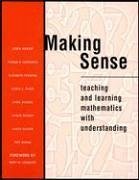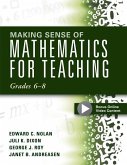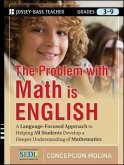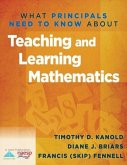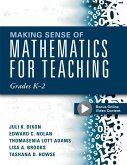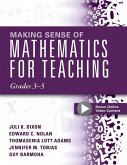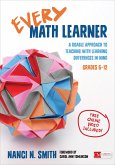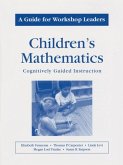Thomas P Carpenter, Elizabeth Fennema, Karen Fuson, James Hiebert, Hanlie Murray, Diane Wearne
Making Sense
Teaching and Learning Mathematics with Understanding
Thomas P Carpenter, Elizabeth Fennema, Karen Fuson, James Hiebert, Hanlie Murray, Diane Wearne
Making Sense
Teaching and Learning Mathematics with Understanding
- Broschiertes Buch
- Merkliste
- Auf die Merkliste
- Bewerten Bewerten
- Teilen
- Produkt teilen
- Produkterinnerung
- Produkterinnerung
This book presents several key principles for teaching mathematics for understanding that you can use to reflect on your own teaching, make more informed decisions, and develop more effective systems of instruction.
Andere Kunden interessierten sich auch für
![Making Sense of Mathematics for Teaching Grades 6-8 Making Sense of Mathematics for Teaching Grades 6-8]() Edward C NolanMaking Sense of Mathematics for Teaching Grades 6-830,99 €
Edward C NolanMaking Sense of Mathematics for Teaching Grades 6-830,99 €![The Problem with Math Is English The Problem with Math Is English]() Concepcion MolinaThe Problem with Math Is English27,99 €
Concepcion MolinaThe Problem with Math Is English27,99 €![What Principals Need to Know about Teaching and Learning Mathematics What Principals Need to Know about Teaching and Learning Mathematics]() Tinothy D. KanoldWhat Principals Need to Know about Teaching and Learning Mathematics27,99 €
Tinothy D. KanoldWhat Principals Need to Know about Teaching and Learning Mathematics27,99 €![Making Sense of Mathematics for Teaching Grades K-2 Making Sense of Mathematics for Teaching Grades K-2]() Juli K DixonMaking Sense of Mathematics for Teaching Grades K-230,99 €
Juli K DixonMaking Sense of Mathematics for Teaching Grades K-230,99 €![Making Sense of Mathematics for Teaching, Grades 3-5 Making Sense of Mathematics for Teaching, Grades 3-5]() Juli K DixonMaking Sense of Mathematics for Teaching, Grades 3-534,99 €
Juli K DixonMaking Sense of Mathematics for Teaching, Grades 3-534,99 €![Every Math Learner, Grades 6-12 Every Math Learner, Grades 6-12]() Nanci N SmithEvery Math Learner, Grades 6-1243,99 €
Nanci N SmithEvery Math Learner, Grades 6-1243,99 €![Childrens Mathematics/A Guide for Workshop Leaders Childrens Mathematics/A Guide for Workshop Leaders]() Thomas P CarpenterChildrens Mathematics/A Guide for Workshop Leaders35,99 €
Thomas P CarpenterChildrens Mathematics/A Guide for Workshop Leaders35,99 €-
-
-
This book presents several key principles for teaching mathematics for understanding that you can use to reflect on your own teaching, make more informed decisions, and develop more effective systems of instruction.
Produktdetails
- Produktdetails
- Verlag: Capstone
- Seitenzahl: 208
- Erscheinungstermin: 21. April 1997
- Englisch
- Abmessung: 234mm x 173mm x 12mm
- Gewicht: 331g
- ISBN-13: 9780435071325
- ISBN-10: 0435071327
- Artikelnr.: 22029735
- Verlag: Capstone
- Seitenzahl: 208
- Erscheinungstermin: 21. April 1997
- Englisch
- Abmessung: 234mm x 173mm x 12mm
- Gewicht: 331g
- ISBN-13: 9780435071325
- ISBN-10: 0435071327
- Artikelnr.: 22029735
Thomas Carpenter was Professor Emeritus of Curriculum and Instruction at the University of Wisconsin-Madison, where he taught for twenty-five years. He is the former editor of the National Council of Teachers of Mathematics (NCTM) Journal for Research in Mathematics Education, and has received the NCTM Lifetime Achievement award for Distinguished Service to Mathematics Education (2004) among other awards. Tom passed away in August 2018, leaving behind a vast legacy to mathematics education thanks to his research into Cognitively Guided Instruction (CGI). That work, created by him and his team of researchers and authors, is available to all teachers in his influential and popular books Children's Mathematics, Thinking Mathematically, and Young Children's Mathematics. In addition, members of Tom's team have already begun the process of extending out from his work in CGI with Extending Children's Mathematics. ?Read more about Tom and his legacy, including warm remembrances from other influential members of the field of mathematics education. Elizabeth Fennema is Emerita Professor of Curriculum and Instruction and Senior Scientist at the Wisconsin Center for Education Research at the University of Wisconsin-Madison. She has studied the teaching and learning of mathematics throughout her professional career, and is well known for her work on gender and mathematics. Math Expressions author, Dr. Karen Fuson, is Professor Emerita of Learning Sciences in the School of Education and Social Policy and the Department of Psychology at Northwestern University. She was a member of the National Research Council's Committees that wrote Adding It Up, Mathematics Learning in Early Childhood, and How Students Learn. Professor Fuson worked on the Common Core State Standards-Math and on the learning progressions for these standards and has advised PARCC and Smarter Balance on their math test design and items. She has published over eighty research articles on mathematics teaching and learning. She directed the Children's Math Worlds (CMW) Research Project-a 10-year study of how to effectively teach students math from an early age. The CMW Research Project examined how teachers can build conceptual supports, including meaningful language, drawings, manipulatives, accessible written methods, and classroom communication methods, to facilitate mathematical competence. The results from this research are a major source of the approaches in Math Expressions, her PK through Grade 6 math program. This program is also based on the research in the NRC reports, on aspects of international math programs, and on her research from around the world. Please see her website karenfusonmath.com for 23 hours of Teaching Progressions explaining the Common Core math domains, videos of classrooms, publications, and resources for remote learning. James Hiebert is a member of a working group of the National Center for Research in Mathematical Sciences Education at the University of Wisconsin-Madison. The purpose of the Group is to consider the teaching and learning of the whole-number arithmetic in elementary school. Hanlie Murray is a member of a working group of the National Center for Research in Mathematical Sciences Education at the University of Wisconsin-Madison. The purpose of the group is to consider the teaching and learning of whole-number arithmetic in elementary school. Diana Wearne is a member of a working group of the National Center for Research in Mathematical Sciences Education at the University of Wisconsin-Madison. The purpose of the group is to consider the teaching and learning of whole-number arithmetic in elementary school.

